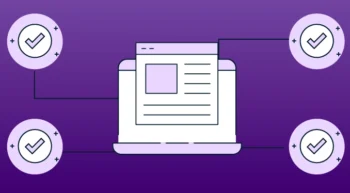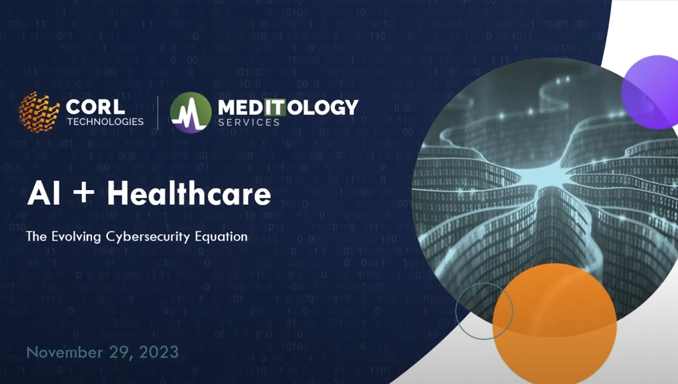BlogCompliance
Unlocking Vendor Assurance: A Deep Dive into CORL Technologies’ Assessment Suite
5 Minute Read
Read Unlocking Vendor Assurance: A Deep Dive into CORL Technologies’ Assessment SuiteCybersecurity
By CORL Technologies | June 2, 2022
Identifying the cybersecurity gaps in your vendor ecosystem is only one part of solving for risk. Risk management and reduction can only be achieved when third-party risk management programs make concrete investments to support their vendors in making timely and cost-effective improvements in their cybersecurity program.
Here at CORL, we are committed to more than risk measurement. We foster excellence and accountability on both sides of the vendor contract by actively championing and managing proactive remediation and risk maintenance.
While our approach is inherently partner agnostic, we provide vendors best-in-class risk reduction services through our sister company, Meditology Services. As a premier consulting services partner that is 100% focused on the healthcare space, Meditology delivers a full range of capabilities for compliance and certification to actively address the gaps identified by CORL and help business associates elevate their cybersecurity posture, best positioning their organizations to service the cyber-sensitive healthcare space.
We have asked the team at Meditology to provide us with a rundown of the most commonly requested services that result in the greatest risk reduction for vendors and their customers. We also matched that guidance up against CORL’s most frequently requested remediation areas for vendors that we see across the thousands of assessments we conduct on behalf of our customers.
Cyber remediation services that have the greatest impact on vendor risk reduction:
When a cyberattack is underway against a healthcare vendor, it becomes a high-priority security incident for the vendor as well as the vendor’s customer base. It is imperative that vendors maintain mature Incident Response Plans (IRPs) that are tested routinely over time.
Vendor security teams must be prepared for common threat vectors including ransomware and have specific playbooks and well-documented roles and responsibilities.
Some actions you can take to support your vendors’ incident response program include:
You don’t know what you don’t know. Healthcare entities should encourage and require routine technical penetration testing for vendor networks to help drive visibility into network-facing vulnerabilities.
Penetration tests also provide a means of validating the maintenance and improvement of vendor security programs over time. The vendor should be able to demonstrate a reduction in the volume and criticality of findings upon each subsequent penetration test.
Some actions you can take to support your vendors’ penetration testing program include:
Cybersecurity certifications like SOC 2 and HITRUST are one of the most efficient and effective ways of driving healthcare organizations into rapid compliance with industry standard practices.
SOC 2 and HITRUST certifications help to educate a wide variety of stakeholders on specific cybersecurity controls and implementation requirements. The clear and prescriptive nature of the control requirements pushes IT and security resources to align with standards and also actively engages other parts of the business like HR, physical security, and executive leadership in the cybersecurity mission.
Some actions you can take to support your vendors’ adoption of cybersecurity certification(s) include:
Healthcare organizations and their vendors are bound together in the shared regulatory mandates for HIPAA Covered Entities (CEs) and Business Associates (BAs).
While the requirements of the HIPAA Security Rule vary somewhat between CEs and BAs, the core foundation of requirements a common for all including administrative, physical, and technical requirements. Noncompliance with the HIPAA Security Rule is also governed by the same authority in the Office for Civil Rights (OCR).
One of the most critical HIPAA Security Rule provisions is the requirement to conduct a Security Risk Analysis. Vendors servicing healthcare must conduct routine risk analysis initiatives (e.g. annually) in alignment with security control standards like HITRUST and NIST. You can learn more about this requirement in Meditology’s Healthcare Security Risk Assessment & HIPAA Security Risk Analysis FAQ publication.
Some actions you can take to support your vendors’ HIPAA compliance include:
This list is by no means the only way that you can help vendors with their security remediation efforts, but it serves as a useful starting point.
Other ways to support vendors with their security remediation efforts include:
Contact our team here at CORL or our sister company, Meditology Services, to learn more about our services and technology dedicated to improving cybersecurity and compliance programs for healthcare entities and their vendors.
 CORL Technologies
CORL Technologies
CORL transforms TPRM chaos into clarity
CORL is a leading provider of vendor risk management solutions for the healthcare industry. CORL gets results by scaling organizational and vendor risk programs through our healthcare vendor risk clearinghouse solution, dashboard reporting that business owners can understand, and proven workflows that drive measurable risk reduction. CORL accelerates the speed of vendor risk assessments and holds vendors accountable for remediating risk exposures.
Related Posts
BlogCompliance
By CORL Technologies | June 24, 2025
5 Minute Read
Read Unlocking Vendor Assurance: A Deep Dive into CORL Technologies’ Assessment Suite
BlogCompliance
By CORL Technologies | April 23, 2025
2 Minute Read
Read The Power of Human + AI: CORL’s Differentiated Approach to Healthcare Risk Management
BlogCompliance
By CORL Technologies | April 17, 2025
2 Minute Read
Read Introducing CORL’s Core 4 Compliance Checklist: A Smarter Path to Healthcare Vendor Compliance
Webinars
WEBINAR AI + Healthcare: The Evolving Cybersecurity Equation The healthcare industry is undergoing a profound transformation, driven by the integration of artificial intelligence (AI) into various facets of healthcare delivery, diagnosis, and treatment. AI technology has the potential to revolutionize healthcare, improving care quality, reducing costs, enhancing efficiency, and even improving outcomes. However, with these […]